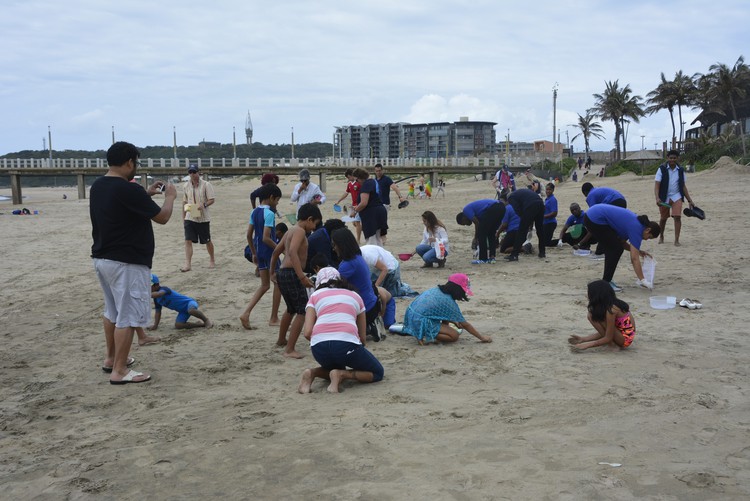
Durbanites have rallied to uShaka Sea World’s plea for help to clear beaches of plastic pellets lost to sea in the recent cargo spill. Photo: Ann Kunz
27 October 2017
As public concern mounts about the extent of industrial plastic pollution arising from the recent Durban cargo spill, responses from authorities have raised more questions than answers.
It was 17 days ago that a severe storm lashed Durban, resulting in a cargo spill from a container vessel that was transporting vast volumes of nurdles – a raw industrial raw material used to make plastic products.
While the nurdles themselves are not toxic, they never disintegrate but merely break down into smaller fragments, absorbing pollutants such as polychlorinated biphenyls (a class of man-made organic chemicals) and organochlorine pesticides which are harmful to both marine life and humans, if consumed.
The danger of polluted nurdles lies in the fact that they get eaten by fish and other marine mammals, contaminating the ocean’s food chain.
Yesterday, the Transnet National Port Authority released its first public statement about the cargo spill, saying that an “urgent meeting” had been held on Tuesday with various other government entities, including the Department of Environmental Affairs (DEA), South African Local Government Association (SALGA), provincial environmental affairs and KZN Ezemvelo Wildlife to discuss mitigating measures.
The statement, released in response to media queries, has earned the ire of several commentators.
As one stakeholder involved in clean-up operations commented: Nurdles have been floating out the port since the storm on 10 October. How can a meeting, 14 days afterwards, be described as urgent?
The authorities first joint meeting to address the pollution event also came several days after hundreds of people in KZN began rallying around a call put out by uShaka Sea World’s education director, Jone Porter, to help clean beaches infested with “billions of nurdles”. (Read Ushaka’s plea to save Durban beaches.)
Roving Reporters ongoing investigation into the pollution event has established that the nurdles lost to sea belong to one of the world’s biggest petrochemical manufacturers, Saudi Basic Industries Corporation (Sabic).
Sabic has not yet responded to queries on the volume of nurdles that got lost in the cargo spill, and the responses from authorities have not provided any clarity on this either.
Transnet said that during the storm the Durban port authorities had to prioritise the re-floating and re-mooring of five drifting vessels, three of which had grounded in the port due to the extraordinary weather conditions.
Transnet also secured two damaged shipping containers that had fallen into the water.
“These containers were retrieved as soon as available resources had successfully dealt with the five affected vessels. Transnet has accounted for all containers that were reported missing,” reads the statement.
Transnet said that “containment measures” were implemented as soon as it was discovered that “at least one of the fallen containers” had held bags of plastic pellets.
Exactly what these “containment measures” were, and when they were implemented is not clear from the statement.
According to Salt Fishing South Africa at least one ruptured six-metre container, leaking 25kg bags of plastic pellets, remained submerged in the harbour for more than 24 hours after the incident. Once recovered, this container allegedly sat uncovered on a Transnet jetty, allowing for the ongoing leakage of nurdles into the port.
The question arises: Why, when the damaged container was discovered, wasn’t a full-scale clean-up organised by the authorities while the pollution was still contained in the harbour?
While Transnet has not yet answered this question, the DEA has thanked a growing number of stakeholders for sparking clean-up operations.
“There has been a massive NGO and community involvement in the clean-up. The DEA is grateful and wants to express its appreciation of these efforts,” said spokesperson Zolile Nqayi.
In the meantime a critical question remains unanswered: What quantity of nurdles has been lost to sea, now drifting in the ocean currents and reportedly washing up on beaches stretching for more than 500km from Port St Johns in the south to St Lucia in the north?
While Sabic has appointed the pollution clean-up company, Drizit Environmental, to coordinate the beach clean-ups, neither company has yet disclosed the volume of nurdles lost through the cargo spillage.
The DEA has alerted municipalities along the KZN coast to be on the lookout for plastic pellets and to lead their own clean-up operations along their area of coastline.
People can also contact Drizit on the 24-hour toll free line 0800 202 202 to find out what they should do with plastic pellets collected from the beaches.